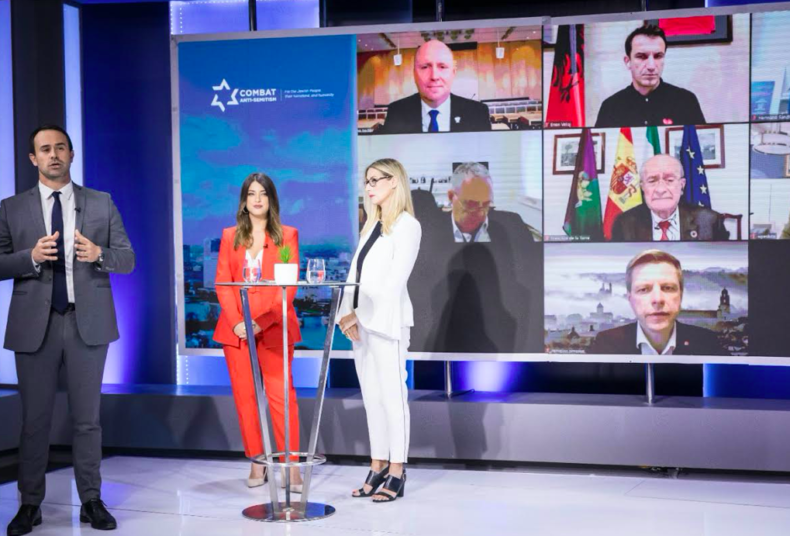Global Mayors’ summit: We must fight antisemitism together

Behind him is the hall where, in the Sixties, the first sessions of one of the most important trials against Nazi criminals responsible for the Final Solution were held. In front of him is a stained glass-window showing the building where, in 1848, the constituent assembly to further the founding of a unitary German state, with respect for fundamental human rights at its core, met.
Places and cornerstones of History that put those with political responsibilities in front of a choice: “Commit to the light, or let the darkness advance”. It is one of the key-concept Mayor of Frankfurt Uwe Becker lingered on, in doing the honours to the many colleagues from all over Europe and the world who chose to join him and the Combat Anti-Semitism Movement in a unique event held last week.
From Buenos Aires to Amsterdam, from Bruxelles to Toronto, from Riga to Tirana: mayors’ joint appeal during the first “Mayors Summit Against Antisemitism” aimed at an even stronger commitment against hatred, through repression of harmful behaviours but also through the development of educational and cultural programs up to today’s many challenges.
“In order to fight antisemitism, we must define it clearly” reflected Vera Jourova, vice-president of the European Commission, while speaking of a “high-growing” threat and recalling the efforts made to that end by the leaders of the European Union, including the suggestion extended to all the Member States to adopt the definition for antisemitism from the International Holocaust Remembrance Alliance.
The summit had more than 30 accessions, yet there were the disconcerting last-minute defections of Virginio Merola, Mayor of Bologna, and Leoluca Orlando, Mayor of Palermo, due to the opposing pressions of some Pro-Palestinian groups. Major focus was on the experience of some cities recently hit by antisemitic terrorism: the impact these dramatic facts have had, and the resulting answer, also from a social point of view.
“I never would have thought that Pittsburgh could become the scenario of the gravest antisemitic crime in American history”, said Mayor Wiliam Peduto, recalling the attack to the Tree of Life synagogue. “By hitting Jews, they hit the whole city. Its values, its history. We are trying to cope by cooperating, every community is exhorted to do its part”.
President of the Union of the Italian Jewish Communities Noemi Di Segni intervened in a panel on the relationships with the institutions and other religious communities. Starting from the high importance of the Agreement signed with the Italian government, Di Segni recalled how the challenge for Judaism today is not only “to be recognized, but also to be an active part of a society”.
An essential commitment in order to fight antisemitism as well. A subject on which there can be no division, Di Segni stressed. Commenting on Merola and Orlando’s absence, she pointed out that “It is astounding that an event dedicated to the fight against antisemitism can become ground for a geo-political clash; it is even more astounding that our Mayors, in account of the institutional role they fill, can withdraw from participating because of pressure, even in light of a program that has nothing to do with Middle-Eastern issues and dynamics”.
What occurred, she considered, “strengthen the conviction of the urgency necessary to deal with antisemitism and to rid the field of misunderstandings and dangerous instrumentalizations, in the hope that our leaders feel free to present their colleagues from other major cities their positions and the good work done in our own cities and in our Country”.
Translated by Silvia Bozzo and revised by Antonella Losavio, students at the Advanced School for Interpreters and Translators of Trieste University, interns at the newspaper office of the Union of the Italian Jewish Communities.
